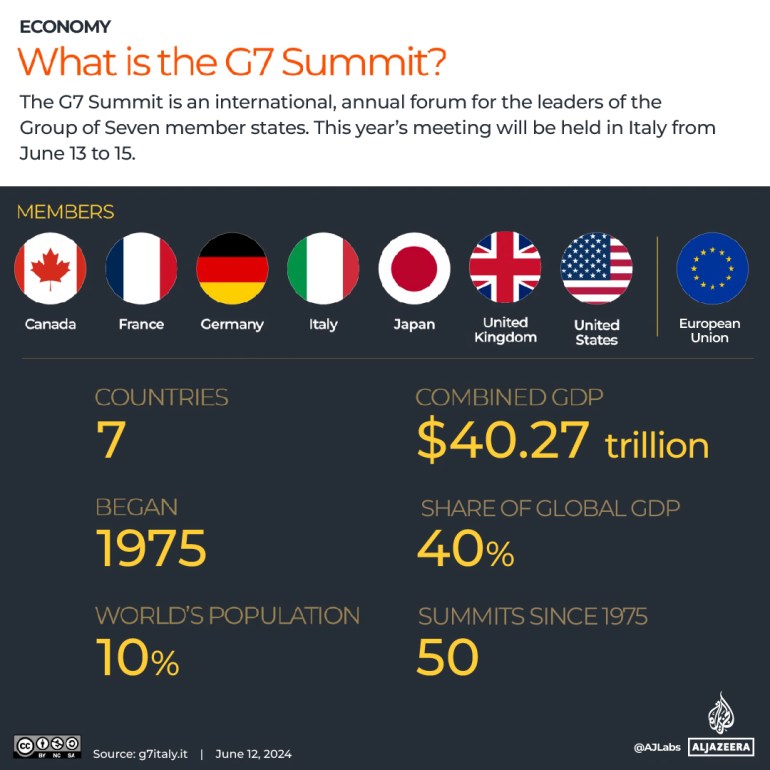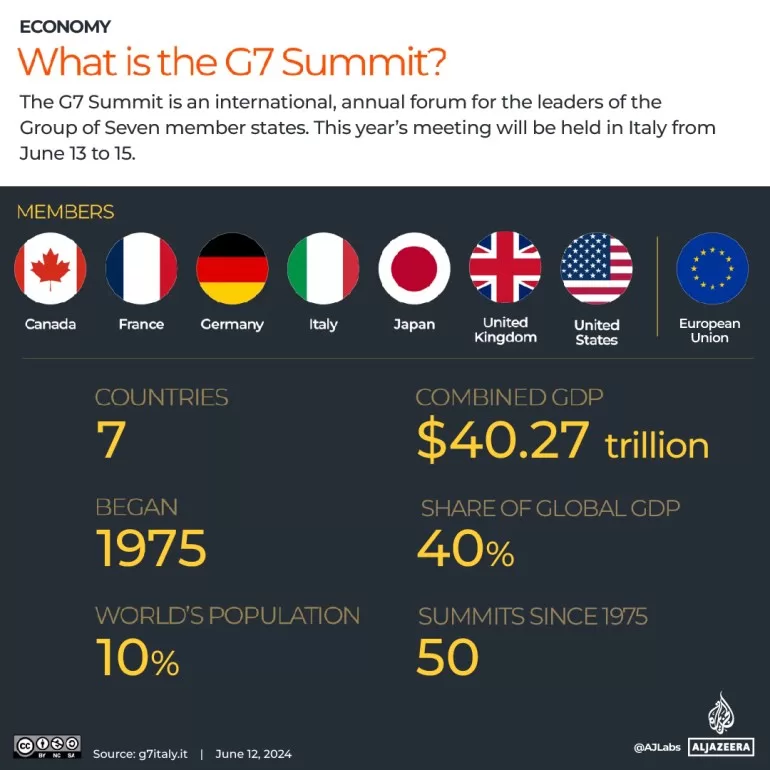“We agree it is critical that UNRWA and other UN organisations and agencies’ distribution networks be fully able to deliver aid to those who need it most, fulfilling their mandate effectively,” G7 nations said in their final communique.
They called for all parties to facilitate “rapid and unimpeded passage of humanitarian relief for civilians in need” in Gaza, particularly women and children.
“Securing full, rapid, safe, and unhindered humanitarian access in all its forms – consistent with international humanitarian law and through all relevant land crossing points, including the Rafah crossing, through maritime delivery routes, including through Ashdod Port – throughout all of Gaza remains an absolute priority.”
UNRWA, which coordinates nearly all aid to Gaza, has been repeatedly targeted by Israel since the war on Gaza began on October 7.
In their statement, the G7 leaders repeated concern at the “unacceptable number of civilian casualties” in the war. They again endorsed a truce and captive release deal.
“We are deeply concerned by the consequences on the civilian population of the ongoing ground operations in Rafah, and the possibility of a full-scale military offensive that would have further dire consequences for civilians. We call on the government of Israel to refrain from such an offensive,” it said.
“We condemn the rise in extremist settler violence committed against Palestinians, which undermines security and stability in the West Bank, and threatens prospects for a lasting peace.”
The international charity Oxfam reacted to the G7 communique by saying: “Israel and its G7 allies must move from words to action, implement their proposals, remove Israeli forces from Gaza, and end the occupation. Hopes must become reality, the time for talking is done.” 
‘Crucial moment in history’
On Friday, the G7 nations turned their attention to migration, artificial intelligence, economic security and the Asia-Pacific region. Their leaders stressed their determination to meet global challenges “at a crucial moment in history”.
The gathering in a luxury resort in Italy’s southern Puglia (Apulia) region also discussed other major topics, such as financial support for Ukraine, climate change, Iran, the situation in the Red Sea, gender equality, and China’s industrial policy and economic security.
“We are working together and with others to address the pressing challenges of our time,” the final communique said.
Migration was the first topic of discussions on Friday with the leaders mulling ways to combat trafficking and increase investment in countries from which refugees and migrants start out on often life-threatening journeys.
The topic is of particular interest to summit host Italy, which lies on one of the major routes into the European Union for people fleeing war and poverty in Africa, the Middle East and Asia.
Right-wing Italian Premier Giorgia Meloni, known for her hardline stance on migration, has been eager to increase investment and funding for African nations as a means of reducing migratory pressure on Europe.
The leaders “launched the G7 Coalition to prevent and counter the smuggling of migrants”, the summit’s final declaration said, noting the seven nations would “focus on the root causes of irregular migration, efforts to enhance border management and curb transnational organized crime, and safe and regular pathways for migration.”
Apart from the G7 nations of Canada, France, Germany, Italy, Japan, the United Kingdom and United States, the Italian hosts also invited several African leaders – Algerian President Abdelmadjid Tebboune, Kenyan President William Ruto and Tunisian President Kais Saied – to press Meloni’s migration and development initiatives.
But rights groups decried what they said was a lack of ambition in support for developing countries.
The ONE Campaign, which advocates for investment in Africa, said it had found the G7’s and European Union’s share of aid going to Africa was at its lowest point since 1973.
“Without any concrete action, the G7 in Italy amounts to no more than pointless platitudes,” said David McNair, executive director at the ONE Campaign. Although the summit’s final statement “reflects promises of increased partnership between the G7 and Africa, there are very few specifics on what new financing, if any, will be available”.
